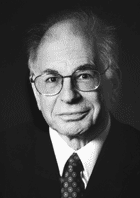« Looking for a good introduction to decsion science? | Main | Upcoming Decision Science Conference »
September 27, 2004
Daniel Kahneman
DECISION SCIENCE RESEARCHER PROFILE: DANIEL KAHNEMAN WINNER OF THE 2002 NOBEL PRIZE IN ECONOMIC SCIENCES

Currently, Daniel Kahneman is both the Eugene Higgins Professor of Psychology and professor of public affairs in the Woodrow Wilson School of Public and International Affairs at Princeton University and a fellow at The Hebrew University in Jerusalem. He is a pioneer and theorist in human judgment and decision-making research. He is known for his collaboration with Amos Tversky in establishing a cognitive basis for common human reasoning using heuristics, and in developing Prospect Theory and other pivotal theories. Kahneman received his B.Sc. in Mathematics and Psychology from The Hebrew University in Jerusalem in 1954, and his Ph.D. in Psychology from the University of California, Berkeley in 1961.
Recent Academic History:
*Former professor of psychology at The University of California, Berkeley
*Fellow at The Canadian Institute for Advanced Research
*Former professor of psychology at The University of British Columbia
*Fellow at The Center for Advanced Study in the Behavioral Sciences
*Former professor at The Hebrew University in Jerusalem
*Member of The American Academy of Arts and Sciences
*Member of The National Academy of Sciences
*Fellow of The American Psychological Association
*Fellow of The American Psychological Society
*Fellow of The Society of Experimental Psychologists
*Fellow of The Econometric Society
Awards:
*The Distinguished Scientific Contribution Award of the American Psychological Association
*The Warren Medal of the Society of Experimental Psychologists
*The Hilgard Award for Career Contributions to General Psychology
*The winner of the 2002 Bank of Sweden Prize in Economic Sciences in Memory of Alfred Nobel
Quotes:
"In one experience I remember vividly, there was a rich range of shades. It must have been late 1941 or early 1942. Jews were required to wear the Star of David and to obey a 6 p.m. curfew. I had gone to play with a Christian friend and had stayed too late. I turned my brown sweater inside out to walk the few blocks home. As I was walking down an empty street, I saw a German soldier approaching. He was wearing the black uniform that I had been told to fear more than others - the one worn by specially recruited SS soldiers. As I came closer to him, trying to walk fast, I noticed that he was looking at me intently. Then he beckoned me over, picked me up, and hugged me. I was terrified that he would notice the star inside my sweater. He was speaking to me with great emotion, in German. When he put me down, he opened his wallet, showed me a picture of a boy, and gave me some money. I went home more certain than ever that my mother was right: people were endlessly complicated and interesting."
"A framing effect is demonstrated by constructing two transparently equivalent versions of a given problem, which nevertheless yield predictably different choices. The standard example of a framing problem, which was developed quite early, is the 'lives saved, lives lost' question, which offers a choice between two public-health programs proposed to deal with an epidemic that is threatening 600 lives: one program will save 200 lives, the other has a 1/3 chance of saving all 600 lives and a 2/3 chance of saving none. In this version, people prefer the program that will save 200 lives for sure. In the second version, one program will result in 400 deaths, the other has a 2/3 chance of 600 deaths and a 1/3 chance of no deaths. In this formulation most people prefer the gamble. If the same respondents are given the two problems on separate occasions, many give incompatible responses. When confronted with their inconsistency, people are quite embarrassed. They are also quite helpless to resolve the inconsistency, because there are no moral intuitions to guide a choice between different sizes of a surviving population."
"The focus of my research for the past fifteen years has been the study of various aspects of experienced utility - the measure of the utility of outcomes as people actually live them. The concept of utility in which I am interested was the one that Bentham and Edgeworth had in mind. However, experienced utility largely disappeared from economic discourse in the twentieth century, in favor of a notion that I call decision utility, which is inferred from choices and used to explain choices. The distinction could be of little relevance for fully rational agents, who presumably maximize experienced utility as well as decision utility. But if rationality cannot be assumed, the quality of consequences becomes worth measuring and the maximization of experienced utility becomes a testable proposition."
"Although behavioral economics has enjoyed much more rapid progress and gained more respectability in economics than appeared possible fifteen years ago, it is still a minority approach and its influence on most fields of economics is negligible. Many economists believe that it is a passing fad, and some hope that it will be. The future may prove them right. But many bright young economists are now betting their careers on the expectation that the current trend will last. And such expectations have a way of being self-fulfilling."
Selected Books:
*Choices, Values and Frames by Daniel Kahneman and Amos Tversky
*Judgment under Uncertainty: Heuristics and Biases by Daniel Kahneman, Paul Slovic, Amos Tversky
*Well-Being: Foundations of Hedonic Psychology by Daniel Kahneman, Edward Diener, Norbert Schwarz
Read More:
Daniel Kahneman Curriculum Vitae
Daniel Kahneman Autobiography at Nobelprize.org .
Daniel Kahneman's Prize Lecture
Posted by DSN at September 27, 2004 06:19 PM